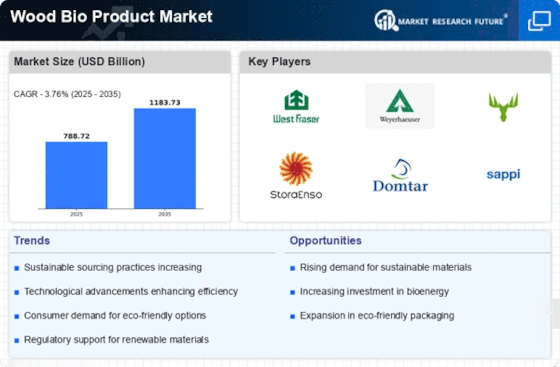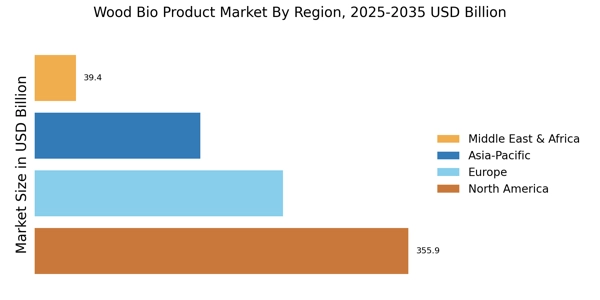Supportive Regulatory Frameworks
Supportive regulatory frameworks are essential for the growth of the Wood Bio Product Market. Governments worldwide are implementing policies that promote the use of renewable resources and incentivize the production of bio-based products. Recent legislative measures have been introduced to encourage sustainable forestry practices and the utilization of wood waste. These regulations not only facilitate market entry for new players but also provide existing companies with the assurance needed to invest in sustainable practices. As these frameworks become more robust, they are expected to bolster the Wood Bio Product Market, fostering a more sustainable future.
Increased Investment in Bioeconomy
Investment in the bioeconomy is a significant driver for the Wood Bio Product Market. Governments and private sectors are increasingly recognizing the economic potential of bio-based products, leading to enhanced funding and research initiatives. In recent years, investments in bio-based technologies have surged, with estimates suggesting that the bioeconomy could reach a value of over 2 trillion dollars by 2030. This influx of capital is likely to foster innovation and development within the Wood Bio Product Market, enabling the creation of new products and applications that align with sustainability goals.
Rising Demand for Renewable Energy
The Wood Bio Product Market is experiencing a notable increase in demand for renewable energy sources. This trend is driven by a global shift towards sustainability and the need to reduce carbon emissions. Biomass energy, derived from wood bio products, is becoming a preferred alternative to fossil fuels. According to recent data, biomass energy accounts for approximately 5% of total energy consumption, with projections indicating a potential increase as more countries implement renewable energy targets. This growing demand for renewable energy is likely to propel the Wood Bio Product Market forward, as stakeholders seek sustainable solutions to meet energy needs.
Consumer Preference for Eco-Friendly Products
There is a growing consumer preference for eco-friendly products, which is influencing the Wood Bio Product Market. As awareness of environmental issues increases, consumers are actively seeking products that are sustainable and have a lower ecological footprint. This shift in consumer behavior is reflected in market data, indicating that sales of wood bio products have risen by approximately 15% in the past year alone. Companies within the Wood Bio Product Market are responding by enhancing their product offerings to meet this demand, thereby positioning themselves favorably in a competitive landscape.
Technological Innovations in Production Processes
Technological innovations are playing a crucial role in shaping the Wood Bio Product Market. Advances in production processes, such as improved methods for converting biomass into biofuels and bioproducts, are enhancing efficiency and reducing costs. For instance, new technologies have been developed that allow for the extraction of higher yields from raw materials, which could potentially increase the overall output of the Wood Bio Product Market. As these technologies continue to evolve, they are likely to attract further investment and drive growth within the sector.

















